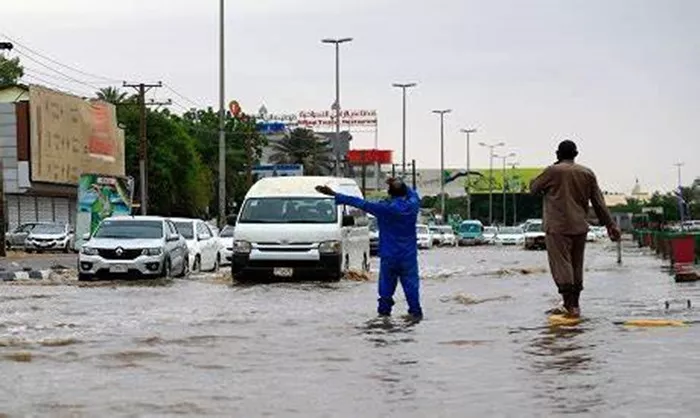Port Sudan, Sudan (AFP) – The ongoing conflict in Sudan has been compounded by devastating floods and heavy rains, claiming the lives of at least 132 people this year, according to a statement from the health ministry released on Monday.
Sudan has endured an unusually intense rainy season since last month, with torrential flooding primarily affecting the northern and eastern regions of the country.
“The total number of affected states is 10, while the number of affected families rose to 31,666 families and individuals to 129,650,” the health ministry said. The ministry further reported that “the total number of deaths reached 132.”
While seasonal flooding is a recurrent issue in Sudan, this year’s deluge has had an exacerbated impact due to more than 16 months of conflict between rival military factions. The ongoing violence has forced millions into displacement, many now residing in vulnerable flood-prone areas.
The ministry also reported significant damage to infrastructure, with 12,420 homes completely destroyed and an additional 11,472 partially damaged. The most severe destruction has occurred in Sudan’s Northern and River Nile states.
The situation worsened on Saturday when intense rainfall in the Arbaat area, located north of the Red Sea city of Port Sudan, caused the Arbaat Dam to collapse, obliterating entire villages. “The torrent swept away houses and animals… people went up to the mountains to protect themselves,” recounted Issa Adroub, a local resident.
The dam, a crucial water source for Port Sudan, has been critically impacted. Port Sudan has become a strategic location for officials who fled the capital, Khartoum, following the outbreak of war.
Local volunteers assisting with relief efforts told AFP that “13 people have been found dead, including women and children, and the search is ongoing for 210 missing persons.” The volunteers also reported that the floodwaters completely washed away 20 villages and severely damaged 50 others. The region is experiencing uncharacteristic rainfall, typically expected between November and March.
Amidst the flooding, there has been a surge in cholera cases, as reported by Sudanese authorities and the United Nations. The World Health Organization reported earlier in August that Sudan has recorded at least 11,327 cholera cases, with 316 fatalities, since June 2023.
Health Minister Haitham Ibrahim attributed the cholera epidemic to “climatic conditions and water contamination.”
The floods come amid a brutal conflict that has raged since April 2023 between the Sudanese army, led by the country’s de facto ruler Abdel Fattah al-Burhan, and the paramilitary Rapid Support Forces, commanded by his former deputy, Mohamed Hamdan Daglo. Both sides have faced accusations of committing war crimes, including the deliberate targeting of civilians and the looting or obstruction of humanitarian aid.
[inline_related_posts title=”You Might Be Interested In” title_align=”left” style=”list” number=”6″ align=”none” ids=”11847,11805,11639″ by=”categories” orderby=”rand” order=”DESC” hide_thumb=”no” thumb_right=”no” views=”no” date=”yes” grid_columns=”2″ post_type=”” tax=””]

































